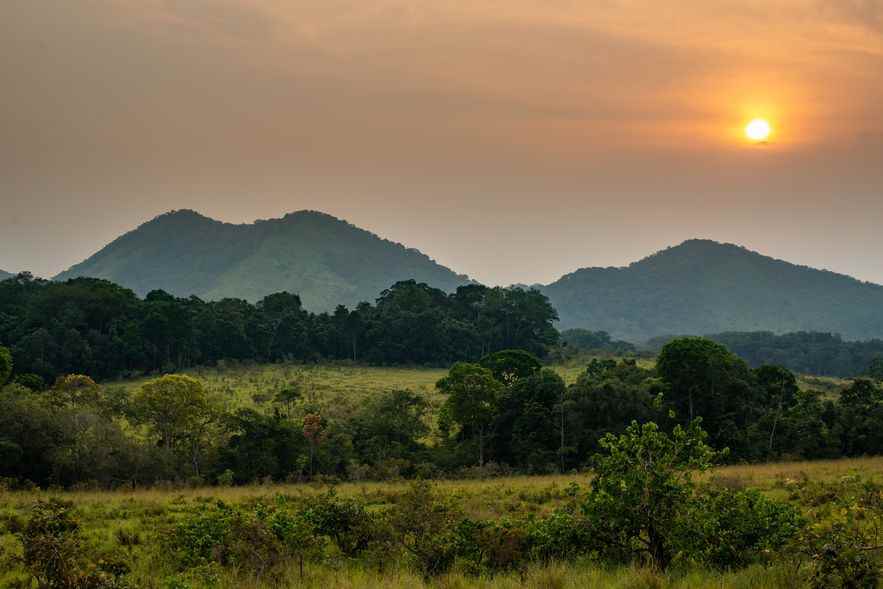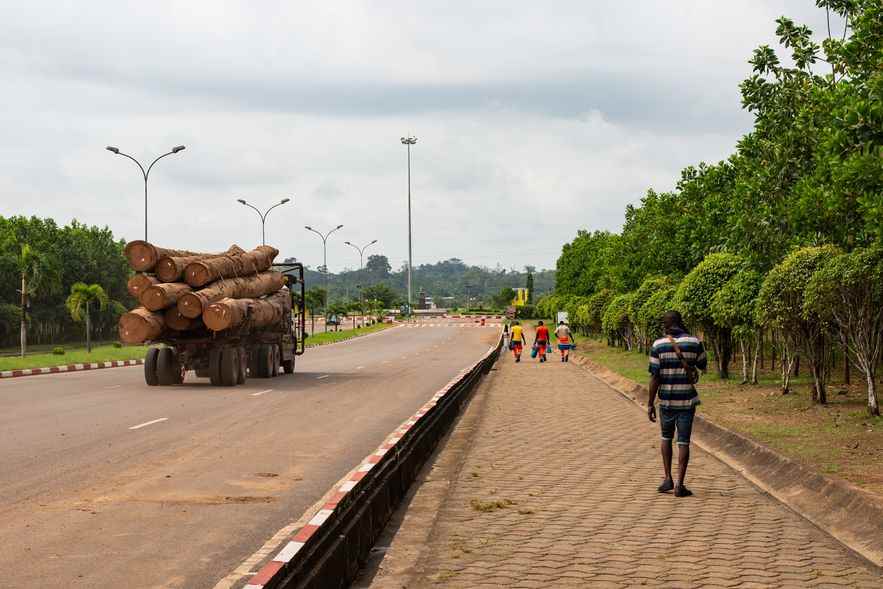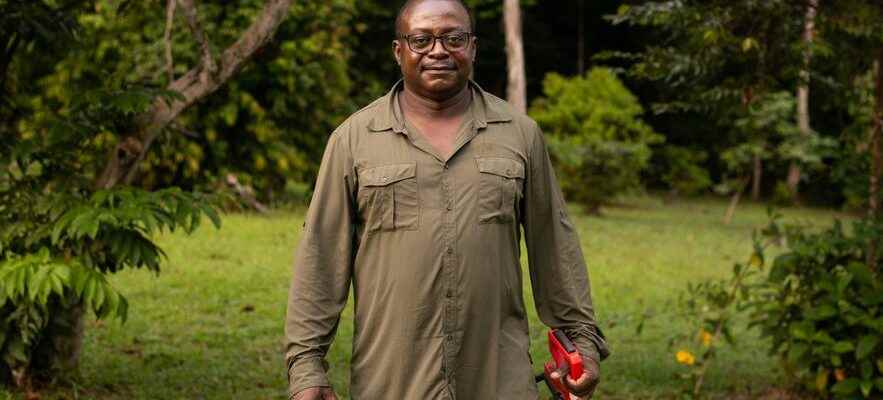Standing on the okoumé wooden terrace of a small, tired pavilion, Loïc Makaga speaks with the clear voice of someone who knows his speech by heart. “Here we have a sample of the diversity of the Gabonese forest, we have been collecting data since 1984 and we have the largest database of climate measurements in the region.” The manager of the research station in Lopé National Park, located in central Gabon, takes a look at the landscape that stretches out before him. A vast savannah of tall grass dotted with trees is displayed in the foreground. In the background, green hills are lost in a milky mist, which a dying sun illuminates in backlight. Nothing is missing to perfect the image of a haven of nature and biodiversity, such as this Central African country often presents itself, not even the famous forest elephants whose small gray silhouette can be seen in the distance, on the edge of a grove.
It is in this 5,000 square kilometer park that the Gabonese adventure of Lee White began, a British naturalized Gabonese in 2008, one of the precursors of the country’s nature conservation policy and who in 2019 became the Minister of Waters and Forests of President Ali Bongo. Within this scientific station made of a few wooden huts, this doctor of zoology graduated from the University of Edinburgh for the first time studied the respiration of the local forest, and measured its CO2 absorption potential. Since then, the analyzes have continued. “Here we have 67 plots of vegetation, which are used to assess the carbon levels contained in our forests”, continues Loïc Makaga.
Finding new, greener revenues
The stakes are high, because for a few years the government of Ali Bongo has made the bet to highlight his country as the first green lung of the region. Gabon is an ocean of greenery which nevertheless historically derives the majority of its income from oil. The canopy covers 88% of the territory, or 23 million hectares, for a population of barely 2.3 million inhabitants. A wealth made up of thousands of species, capable according to Lee White of absorbing 140 million tonnes of CO2 per year. And at a time of great promises of carbon neutrality, Gabon intends to take advantage of this new challenge, the heart of international climate discussions. In 2022, Lee White announced that he wanted to issue 90 million carbon credits, i.e. as many emission rights that can be purchased by companies and countries to offset their own emissions in order to meet their climate commitments.
Loïc Makaga, the manager of the scientific station of La Lopé National Park, in Gabon.
© / Valentin Ehkirch / L’Express
“Even before he came to power, Ali Bongo had campaigned by declaring that he wanted to switch from oil income to carbon income. There is a desire to anticipate: since oil reserves are decreasing, the country must find new income” , explains Alain Karsenty, economist and researcher at the Center for International Cooperation in Agricultural Research for Development. Sign of this positioning, the inauguration on March 1 by Ali Bongo in the presence of Emmanuel Macron of the One Forest Summit, a high mass of the environment, dedicated to forests, which should make it possible to find mechanisms to finance and protect, while promoting the sustainable development of African countries.

The view of the savannah from the scientific station of La Lopé National Park, Gabon, in February 2023.
© / Valentin Ehkirch / L’Express
But beyond carbon credits, to succeed in making forests the country’s main source of income, Lee White has a plan. And that means better logging. In the salons of Libreville airport, before a flight to the United Kingdom, the minister details his strategy. “Today we process about 3 million cubic meters of wood, or about half of our forest permits. It is estimated that in the medium term we can double production and the number of jobs and move this economy from 1 to 2 billion euros per year. The goal is undoubtedly ambitious, but the first steps have already been taken, he says. Since 2009 the country has banned the export of logs (unprocessed tree trunks), in order to avoid losing a significant part of the value of the wood. The obligation of processing on Gabonese soil has made it possible to create an embryonic sector, but also to better enhance the forest heritage, assures the minister. The government representative is convinced that his plan must make the operations more sustainable, a sine qua non condition if we want the Gabonese canopies to absorb as much carbon as promised. “By increasing the value of the forest, we can preserve it, because it will be in the economic and ecological interest of the country”, insists Lee White.
Unrealistic goals
But this speech badly conceals the difficulties in implementing this plan. Along the red runs that criss-cross the heart of the country, dense vegetation like a wall sometimes opens onto signs indicating here and there muddy paths leading to logging. 80% of the surface of the country is covered by concessions, the vast majority of which is held by Asian companies whose failure to respect the rules of exploitation has become legendary. The stories follow one another of suitcases filled with tickets to buy the benevolence of the officials of the Waters and Forests and continue to cut down trees without respecting the management plans which must allow the regeneration of the forest. “Apart from the demand for agriculture, the second driver of forest degradation is illegal logging and until today the State has not been able to control it”, regrets Marthe Mapangou the regional manager. of the forests and environment dossier at the French Development Agency. Before that she had a thousand lives, as a manager within the WWF, a civil servant at the Ministry of Water and Forests, and a specialist in forest economics.

At the entrance to the Nkok special economic zone, near Libreville, Gabon.
© / Valentin Ehkirch / L’Express
She tells how, in an attempt to control this industry, the government has toughened up its rhetoric. Compliance must now go through the establishment of a management plan for farms supposed to determine the species present on the concessions and restrict felling. “What we see for the moment is that the annual operating plans are very little respected”, nuance Luc Mathot, the founder of the NGO Conservation justice, which investigates illegal exploitations and works in partnership with authorities. This discrepancy between the declarations and the concrete implication of the measures was also felt in 2018, when Lee White affirmed that he wanted to achieve the objective of 100% of certified sustainable forest concessions by 2022. Five years later, only four forest operators out of more than 150 in the country had obtained the FSC label, guaranteeing management that respects the environment and social standards. “Lee White completely misses his goal, and he knew very well that he was not realistic”, asserts Marc Ona. The president of the environmental NGO Brainforest is a staunch critic of the government and of the minister’s policies. According to him, “if some are certified it is because of the requirement of the European market, it is not an environmental requirement, it is a commercial requirement”.
Low anthropogenic pressure
Despite an increasingly restrictive framework, the country is still struggling with the problems of irregularity and corruption is everywhere. Until the entrance to the special economic zone of Nkok, in Libreville, which covers 126 hectares, managed by the GSEZ consortium – controlled by the Gabonese state and a Singaporean investor – and dedicated to wood processing. It is here that a third of the national production of logs transits, and strict regulations must allow only timber from legal fellings to enter. But here too, insider accounts point to fraud and pressure to smuggle non-compliant timber into the area. “We are fighting against the operators, but also against the administration”, breathes Marc Ona, whose NGO participated in the establishment of the wood traceability system in Nkok.
Still largely preserved, the Gabonese forest today seems to escape massive deforestation, even better, it would even gain ground. But what protects the species of okoumé, padouk or very precious kevazingo, which make up the Gabonese forest, today seems less the country’s environmental policy than the low anthropogenic pressure. Until when ?
